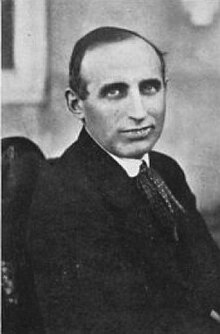Eugene Varga
Yevgeny Samuilowitsch Warga ( Russian Евге́ний Самуи́лович Ва́рга , Hungarian : Jenő Varga; born November 6, 1879 in Budapest ; † October 7, 1964 in Moscow ) was a Marxist economist of Hungarian descent.
Life
Eugen Varga studied philosophy and economic geography at the University of Budapest . His wide range of interests also made him a member of the Hungarian Psychoanalytic Society. From 1906 he published mainly on economic topics. Before the First World War he became known through his public discussion with Otto Bauer about the causes of inflation in Austria-Hungary . At that time he was one of Karl Kautsky's followers . From 1909 to 1918 Varga worked as a teacher at a Budapest business school.
In 1919 Varga became Minister of Finance of the short-lived Hungarian Soviet Republic . After their fall, he fled to Vienna . From there he went to the Soviet Union in 1920 , where he worked for the Comintern . He specialized in international economic problems and agricultural issues. From 1922 to 1927 he worked in the trade department of the Soviet embassy in Berlin . In the 1930s he was Josef Stalin's economic advisor . He survived the purges of those years unmolested. He was a member of both the CPSU and the Communist Party of Hungary.
Varga wrote the economic reports for the congresses of the Comintern from 1921 to 1935. He published many studies on the international economy in which he assessed quantitative developments in production, investment and employment using official economic data from various countries. The Institute for World Economy and International Relations was founded in 1956 as the successor organization to his institute .
In 1946 he published The Economic Transformation of Capitalism at the End of the Second World War . He wrote here that the capitalist system is more stable than previously thought. As a result, his institute was closed. In the second edition of the Great Soviet Encyclopedia he was referred to as a "bourgeois economist". After Stalin's death, the new rulers in the Moscow Kremlin were not interested in Varga's predictions of a "necessary" economic crisis in the United States because they pursued a policy of peaceful coexistence .
Varga did not return to his native Hungary, but worked as an economic advisor to Mátyás Rákosi . His plans for economic planning, price control and monetary reform were implemented by the Hungarian communists. With the fall of Rákosis in the Hungarian uprising in 1956 and the takeover of government by János Kádár , his consultancy ended.
Fonts
- The Crisis of the Capitalist World Economy , Publishing House of the Communist International ; Delivery point for Germany: "Carl Hoym Nachf. Louis Cahnbley", Hamburg 1921
- The crisis of capitalism and its political consequences. Edited and introduced by Elmar Altvater ; Frankfurt / Main 1969; 2nd edition, 1974, ISBN 3-434-45037-8
- Economy and economic policy, quarterly reports 1922–1939 , 5 volumes. Edited by Jörg Goldberg , with prefaces by Georg Göncöl , Jörg Goldberg and Josef Schleifstein . Berlin: the european book, 1977; DNB 550287264
literature
- Peter Knirsch: Eugen Varga. (= Bibliographical Notes from the Eastern European Institute at the Free University of Berlin, 5) Eastern European Institute at the Free University, Berlin 1961.
- Eugen S. Varga , in: Internationales Biographisches Archiv 47/1964 of November 9, 1964, in the Munzinger Archive ( beginning of article freely available)
- Laszlo Tikos: E. Varga's activity as an economic analyst and publicist in the Hungarian social democracy, in the Konimtern, in the Academy of Sciences of the USSR. Working group for Eastern European research Tübingen, Böhlau, Vienna / Cologne / Graz 1965.
- Gerhard Duda: Jenö Varga and the history of the institute for world economy and world politics in Moscow 1921-1970. Akademie-Verlag, Berlin 1994, ISBN 3-05-002326-0 .
- André H. Mommen: Jenő Varga, economist of the Comintern (1920–1928). CEPS, Maarssen 2009, ISBN 978-90-79885-05-3 .
Web links
- Literature by and about Eugen Varga in the catalog of the German National Library
- Newspaper article about Eugen Varga in the 20th century press kit of the ZBW - Leibniz Information Center for Economics .
- Review by Jürgen Kuczynski on economy and economic policy (PDF; 2.8 MB)
| personal data | |
|---|---|
| SURNAME | Varga, Eugene |
| ALTERNATIVE NAMES | Warga, Yevgeny Samuilovich (full name); Varga, Jenő (Hungarian) |
| BRIEF DESCRIPTION | Hungarian-Soviet economist |
| DATE OF BIRTH | November 6, 1879 |
| PLACE OF BIRTH | Budapest |
| DATE OF DEATH | October 7, 1964 |
| Place of death | Moscow |

